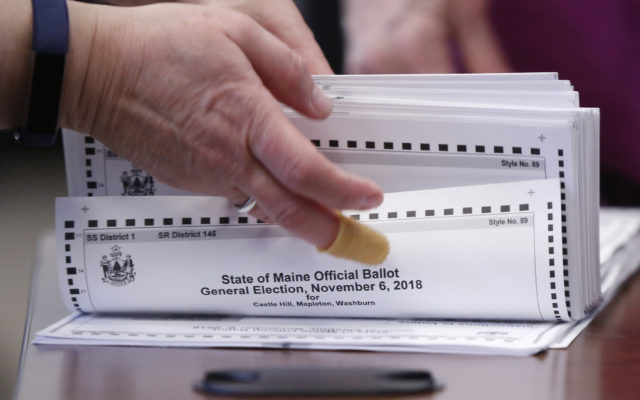
How Maine’s congressional delegation views a voter ID drive
By Billy Kobin, Bangor Daily News Staff
The push to require Mainers to provide photo identification at the polls is a state-level issue that voters will settle in November, but Maine’s members of Congress also have thoughts on this year’s high-profile referendum.
Their answers reveal attempts to delicately support, question or shy away from commenting on a voter ID effort that may affect voters in their own 2026 races while tying into broader election security debates at the federal level.
Out of the four members, U.S. Rep. Jared Golden, a moderate Democrat representing Maine’s 2nd District, is drawing particular attention for his views on state matters given his status as a rumored 2026 gubernatorial candidate.
He acknowledged in a Monday interview that he supported federal legislation requiring people to present an ID when registering to vote, which is Maine’s current policy. But he also opposed a bill while he was in the state Legislature to require an ID to cast a ballot.
“The devil is in the details in terms of whether it’s a policy I could support,” Golden said of the looming referendum.
The Dinner Table, a political committee led by Rep. Laurel Libby, R-Auburn, and conservative activist Alex Titcomb, is behind the “Voter ID for ME” initiative whose supporters were at the State House on Monday to submit signatures to place the question on the November ballot.
Titcomb said the group prefers state lawmakers would pass a measure similar to voter ID laws in 36 states, but the Democratic-controlled Legislature has rejected previous Republican attempts. If Maine voters approve the referendum, then they would have to show ID for both in-person and absentee voting.

The proposal directs the secretary of state to issue free ID cards to voters without a driver’s license. It allows voters without a photo ID to complete a ballot and then within four days present a photo ID to a local election official.
The “Voter ID for ME” effort also would require towns to only have one drop box for collecting absentee ballots and would no longer allow telephone applications for absentee ballots nor allow voters to automatically receive absentee ballots without submitting separate requests for each election.
U.S. Sen. Susan Collins, the lone Republican in the state’s congressional delegation, avoided explicitly backing the effort but said Mainers “must be confident that the votes they cast go to their intended candidate and are not offset by illegally cast ballots.”
“The primary responsibility for securing and administering elections lies with the states, and I support the efforts of state and local officials to make it easy to vote and hard to cheat in elections,” Collins said in a statement.
A spokesperson for U.S. Sen. Angus King, an independent who caucuses with Democrats, said he “typically refrains from weighing in on state referendums,” while a spokesperson for U.S. Rep. Chellie Pingree, a progressive representing Maine’s 1st District, said she had no comment.
Studies have found extremely low rates of voter fraud in U.S. elections. A Massachusetts Institute of Technology roundup of scientific literature found it is unclear that voter ID laws depress turnout while also finding little evidence they increase voter confidence.
Opponents to voter ID laws, including the League of Women Voters of Maine and Secretary of State Shenna Bellows, said they can have a chilling effect on voter participation in a state that has ranked high nationally in turnout while hurting people of color and residents who are older, poorer, disabled or without an active driver’s license.
“It’s disappointing to see Mainers try to impose these barriers on their fellow Mainers’ right to vote, when this state is justly proud of its high voter participation rates,” Anna Kellar, executive director of League of Women Voters of Maine, said in a statement. “These restrictions can and will harm every type of voter.”
A 2023 poll from the University of New Hampshire Survey Center found 63 percent of Mainers strongly or somewhat support requiring photo identification to vote. Supporters included 71 percent of independents and nearly all Republicans, while 34 percent of Democrats backed a requirement.
Golden alluded to that support among Mainers but mentioned the other aspects of the voter ID initiative affecting absentee voting may not play as well. Golden also noted then-Gov. Paul LePage and Republican lawmakers banned same-day voter registration in 2011 before Maine voters overturned that decision later that year.
“I’m going to bet that most Mainers [do not support] making it harder to vote,” Golden said.